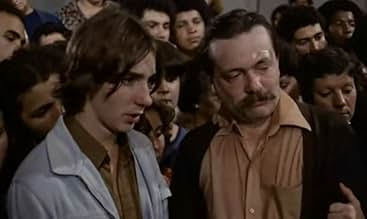AVALIAÇÃO DA IMDb
8,2/10
1,9 mil
SUA AVALIAÇÃO
O filho de um líder sindical não quer participar de uma greve porque sua esposa está grávida, ignorando a tradição de ativismo político de seu pai.O filho de um líder sindical não quer participar de uma greve porque sua esposa está grávida, ignorando a tradição de ativismo político de seu pai.O filho de um líder sindical não quer participar de uma greve porque sua esposa está grávida, ignorando a tradição de ativismo político de seu pai.
- Prêmios
- 10 vitórias e 1 indicação no total
- Direção
- Roteiristas
- Elenco e equipe completos
- Produção, bilheteria e muito mais no IMDbPro
Enredo
Você sabia?
- CuriosidadesFinal feature film directed by Leon Hirszman. His later projects were all documentaries.
Avaliação em destaque
Latin American cinema is always hard to understand, and being a latin american myself i think i can shed some light into this movie. Its mostly a period piece, taking place soon after famous brazilian dictatorship period (1964-1984), a mostly righ-wing endeavor that left Brazil with deep scars, not only in the political department but in the cultural as well.
And as a period piece this movie really shines, encapturing Brazil social problems and culture with a very realistic tone.
Unfortunatelly thats when the good thing stop since, apart from Montenegro's shining performance and Guarnieri perfectly portraying "himself" the other actors struggle to do a decent job, most of the times they seem to be reading the lines and the restored version has some problems with audio sync, something that really takes you out of the movie.
On one hand the director tries to do sympathy with Tiao, the main character, that is put in an unfortunate position, having to choose between taking the side of his fellow workers and join a strike or keep working to provide for his family, but soon as the movie is getting close to the end this simpathy goes away and the black and white (us and them) views of the director and writer, always trying to push the class struggle agenda, really show.
The movie is, in the end, a very heavy handed political panflet, ignoring the many sides of a complicated problem and relying heavily in the "traitor! traitor!" argument, one that, as we may as well know, is not new to the political side of things.
And as a period piece this movie really shines, encapturing Brazil social problems and culture with a very realistic tone.
Unfortunatelly thats when the good thing stop since, apart from Montenegro's shining performance and Guarnieri perfectly portraying "himself" the other actors struggle to do a decent job, most of the times they seem to be reading the lines and the restored version has some problems with audio sync, something that really takes you out of the movie.
On one hand the director tries to do sympathy with Tiao, the main character, that is put in an unfortunate position, having to choose between taking the side of his fellow workers and join a strike or keep working to provide for his family, but soon as the movie is getting close to the end this simpathy goes away and the black and white (us and them) views of the director and writer, always trying to push the class struggle agenda, really show.
The movie is, in the end, a very heavy handed political panflet, ignoring the many sides of a complicated problem and relying heavily in the "traitor! traitor!" argument, one that, as we may as well know, is not new to the political side of things.
- guijacomo
- 15 de abr. de 2020
- Link permanente
Principais escolhas
Faça login para avaliar e ver a lista de recomendações personalizadas
- How long is They Don't Wear Black Tie?Fornecido pela Alexa
Detalhes
Contribua para esta página
Sugerir uma alteração ou adicionar conteúdo ausente

Principal brecha
By what name was Eles Não Usam Black-Tie (1981) officially released in Canada in English?
Responda





























